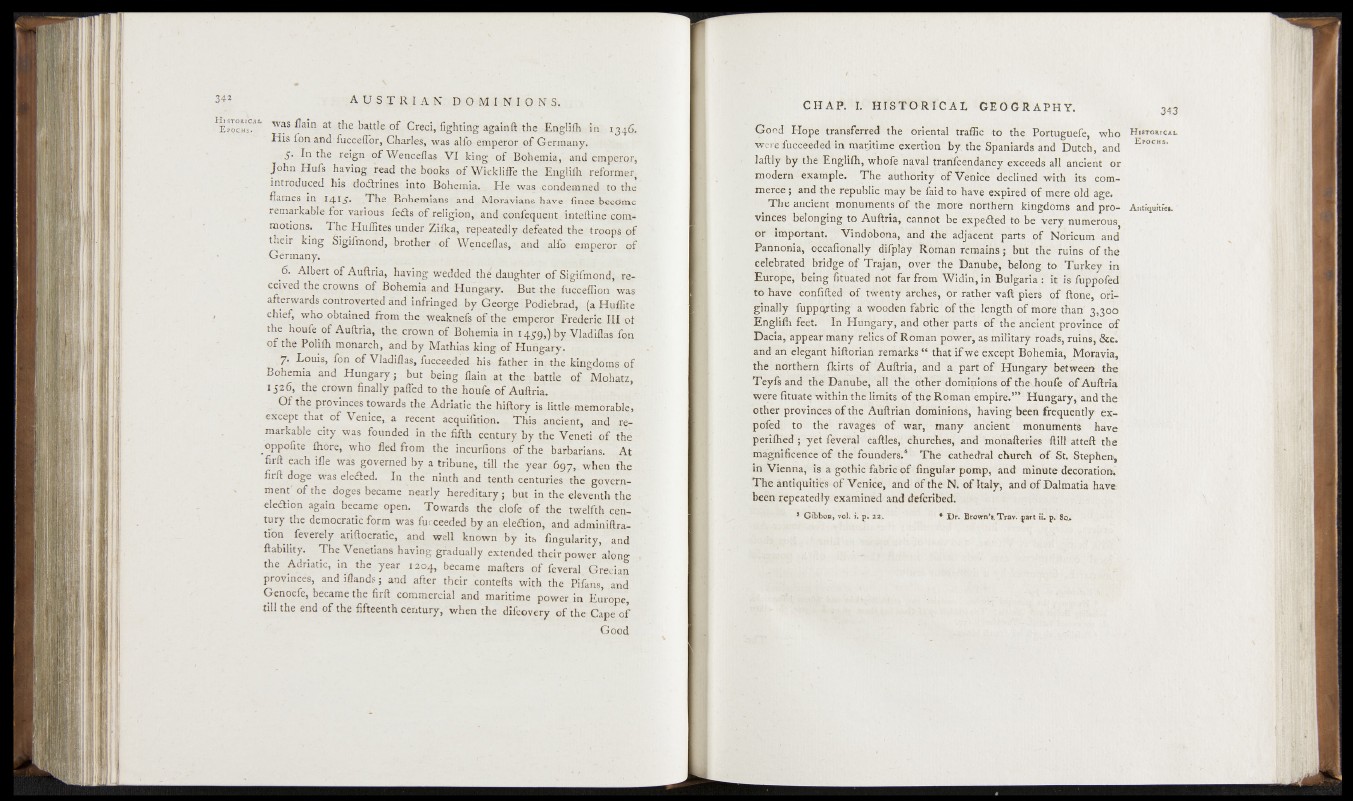
K i s'TpjR i ’d
E pochs»11 was .flairt at the-ba$d,e,. ,of, Greci,fighting againft the.'Eöghlh .in 134^
His fan and- fuc^flor^Charles, was alfo.-émperor of Germany,
,5* the reign -of Wenceflas VI king, of Bohemia, and emp^rj?rj
Jphn.Hufs having read the books of Wickiiffe the Englilh reformer,
introduced his doftnnes; into Bohemia.. He' was \Condemof$d to the
fiames in, i 4 I5- The Bohemians'and Moravians hpye ■ fiace becöme
remarkable,for various fédts o f religion,- and cpnfeq-uent inteftine G-pm-
motians; The Hu-ffites under Zilka, repeatedly defeated the trpnps 9f
their king Sigifmond, brother-of Wenceflas, - and alfo, emperor of
Germany.
6. Albert of Auftria, having wedded th^ daughter of-Sigifinond j* r^-
ceiyed the crowns o f Bohemia and Hungary. But -the.fucceffion -was
afterwards controverted and infringed by George Podiebrad, (a-Hpi|ite
chief, who. obtained from the weakness o f the emperor Frederic III jot
the houfe of Auftria, the crpwn of Bohemia in 1459,) by Vladiflas fen
o f the Poliïh monarch, and by Mathias king of Hungary. r
7. Louis, Ion of Vladiflas, fucceeded. his father in -the kingdoms -of
Bohemia and Hungary ; but. being flain .at the battle pfi.'Mohatz,
1526, the crown finally pafled to the houfe of Auftria.
Of the. provinces towards the Adriatic the hiftorv is little-mfemorablq;
except that of Venice^ a recent acquifition.
markable city was founded in the fifth century- by the Veneth.of thé
oppofite fbére, who fled from the incurfions o f the barbarians. ,.At
firftèach ifle Was governed by a tribune, till’ the year .697", when tip
firft doge Was elected. ïu the ninth and tenth centuries, the goyernr
ment'o f the doges became nearly hereditary; fiut in'the eleventh the
election again became open. Towards the clofe of the twelfth century
the democratic form was fucceeded by an election, and adminiftra-
tion fevereïy ariftpcratic, and well known by‘ its Angularity, and
liability. The Venetians having gradually extended their .power ’along
the Adriatic, in the year 1204, became mailers of feveral Greciap
provinces, and iflands; and after their Cornells with the Pifans, .and
Genoefe, became the firft commercial and maritime power in Europe,
till the end of the fifteenth century, when the difcovery of the Cape of
Good
Good Hope transferred the oriérital traffic -to the Portuguefe, who
wvere fuccédded^in maritime1 exertion' by the'Spaniards and Dutch, and
daftly? by fffiê 'Englilh, whole naval tranfcendancy exceeds all ancient or
modern example. The ^aiathBrily' oTVehice cflf||fiifeyd with its commerce
; and the repnhl^c|rhay■ fie! faid tofpavè' expired of mere old age.
The ancient. monuiriferifs^o'f ■ the ïmokè^hortKetn kingdoms and provinces
belonging;to Aftftria, fexpeded to be -very numerous
or important. Vindobóna, and the adjacent. parts o f Noricum and
Pannonia, ocfSffonally difplèy'Roman remains; but 'thé' -ruins of the,
celebrated bridge of Trajan,^oyer^'the Danube, belong to Turkey in
Europe, being fitüajed .not far from'Widuf^m Bulgaria:'it is fuppofed
to have cónfifted' of twenty arches, or* rather vaft pjérs ófftohe, or>.
ginally fuppqrting' a wooden fabric Joftfie length ofiinore thaif'3^00
Englifh feet. " In Hungary, and other parts o ïvtbe'aMnèïft province of
Dacia, appear many relics of Röma'n power, as military roads, ruins, &cl
and an elegant hiftoriaff remarks “ that if we except Bohemia, Moravia,
the northern Ikirts o f Auftria, and a. part o f “Hungary ’ between the
Teyis and the Danube, all the other dominions of thedioufe o f Auftria
were fituate withlh thl limits of the Roman empire.5” Hungary,'and'the
other province#of the Auftrian dominions, having been frequently ex-
pofed to the ravages of war, many "ancient ‘ monuments have
periihed; yet Ibveral' caftles, churches, and mbiiafteries ftill-atteft the
magnificence o f the'founders;^ Thé cathedral church of St. Stephen,
m Vienna, is a gothic fabric o f lingular pomp, and minute decoratioiW
The antiquitifes o f Venice, and of the N. of Italy, and of Dalmatia have
been repeatedly examined and deferibed.
5 Gibbon, tol. i. p. 22.. * Dr. Brown’«. Trav. part ii. p. 8o.
H istorical
E pochs.
Antiquitic*.